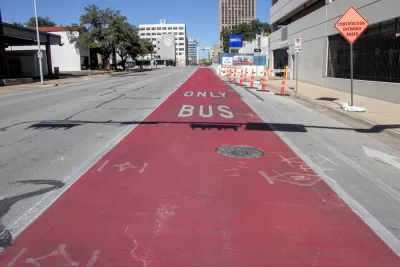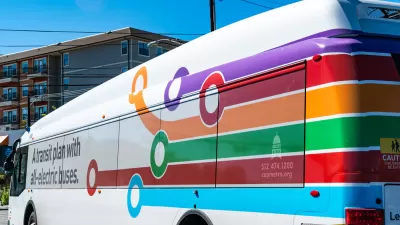A former Austin city councilmember, now at the Texas State Legislature, is trying to make it harder for Austin Transit Partnership to borrow money to fund Project Connect, the Austin region’s big, ambitious transit investment plan.

Project Connect, Austin’s plan to transform public transit in the region, is facing a new obstacle in the Texas State legislature. According to an article by Nathan Bernier for KUT, new legislation under consideration at the state legislature would limit the ability of the Austin Transit Partnership (ATP) to borrow money.
“The proposals — House Bill 3899 and Senate Bill 1791 — would force the ATP to hold a citywide election before borrowing large amounts of money to pay for the expensive upfront costs of building the light-rail system. ATP estimates it would need to borrow up to $2.5 billion and plans to repay the money with its existing stream of tax revenue,” reports Bernier.The bill was written by Republican state Rep. Ellen Troxclair, a former Austin City Council. Rep. Troxclair is quoted in the article saying the legislation will ensure transperancy for the Project Connect funding process.
The report about the new legislation comes just a few days before ATP is expected to announce proposals for scaling back the planned project scope of Project Connect, due to cost overruns associated with engineering challenges, inflation, and labor shortages. The original plan would have added two new light rail lines, four new rapid bus routes, and a new commuter rail line. Project Connect also called for expanded service on the Red Line, the city’s only existing rail transit route and add new on-demand transit capacity.
The article suggests that if passed, the legislation could cost Austin when it goes for federal funding in competitive grant processes.
FULL STORY: Texas Legislature could derail Austin's transit expansion

Study: Maui’s Plan to Convert Vacation Rentals to Long-Term Housing Could Cause Nearly $1 Billion Economic Loss
The plan would reduce visitor accommodation by 25,% resulting in 1,900 jobs lost.

North Texas Transit Leaders Tout Benefits of TOD for Growing Region
At a summit focused on transit-oriented development, policymakers discussed how North Texas’ expanded light rail system can serve as a tool for economic growth.

Why Should We Subsidize Public Transportation?
Many public transit agencies face financial stress due to rising costs, declining fare revenue, and declining subsidies. Transit advocates must provide a strong business case for increasing public transit funding.

How Community Science Connects People, Parks, and Biodiversity
Community science engages people of all backgrounds in documenting local biodiversity, strengthening connections to nature, and contributing to global efforts like the City Nature Challenge to build a more inclusive and resilient future.

Alabama: Trump Terminates Settlements for Black Communities Harmed By Raw Sewage
Trump deemed the landmark civil rights agreement “illegal DEI and environmental justice policy.”

Dear Tesla Driver: “It’s not You, It’s Him.”
Amidst a booming bumper sticker industry, one writer offers solace to those asking, “Does this car make me look fascist?”
Urban Design for Planners 1: Software Tools
This six-course series explores essential urban design concepts using open source software and equips planners with the tools they need to participate fully in the urban design process.
Planning for Universal Design
Learn the tools for implementing Universal Design in planning regulations.
City of Santa Clarita
Ascent Environmental
Institute for Housing and Urban Development Studies (IHS)
City of Grandview
Harvard GSD Executive Education
Toledo-Lucas County Plan Commissions
Salt Lake City
NYU Wagner Graduate School of Public Service



























